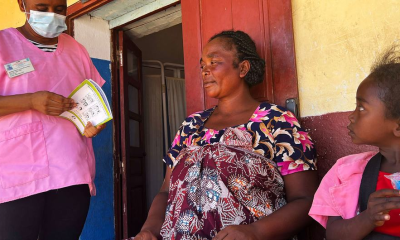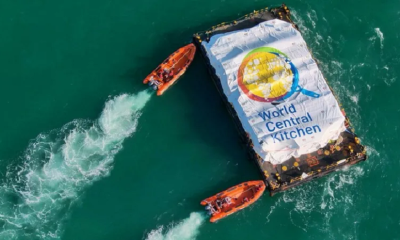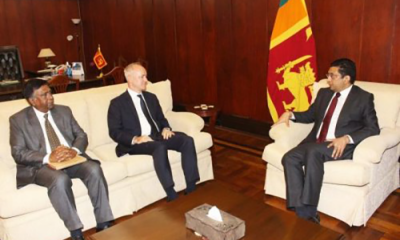News
Sri Lankans struggling to buy food, says WFP report
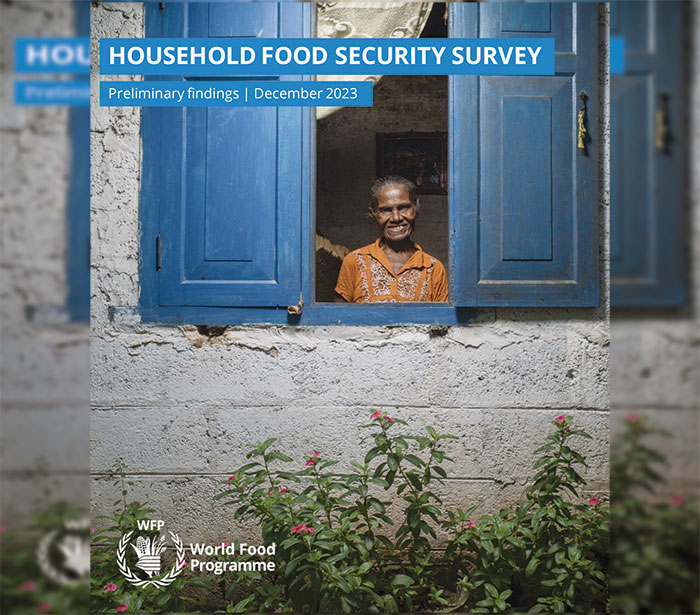
Nearly a half of Sri Lanka’s households are adopting livelihood-based coping strategies to buy food, says a recent report published by the World Food Programme.
The WFP’s ‘Sri Lanka – Household Food Security Survey: Preliminary Findings, December 2023’ says that 43 percent of households were adopting livelihood-based coping strategies to cope with the lack of adequate food. Borrowing money to buy food and purchasing food on credit were the most commonly adopted strategies, by 27 and 26 percent of households, respectively, says the report, adding that households remain vulnerable to future shocks and stresses.
“According to the survey, a high proportion of estate households (80 percent) adopted livelihood-based coping strategies, followed by 50 percent of urban households. In the rural sector, 41 percent of households are resorting to coping strategies. In terms of household characteristics, 43 percent of male-headed households and 42 percent of female-headed households are turning to livelihood-based coping strategies. While this is not a significant difference, a larger proportion of female-headed households are adopting more severe coping strategies compared to male-headed households such as selling assets and spending savings,” it said.
The report has identified six livelihood-based coping strategies such as borrowing money, purchasing food on credit, spending savings or skipping debt payment, selling jewellery to buy food, reducing the spending on education and health and selling household assets. It has been observed that 27 percent of households relied on borrowing money while 26 percent opted for purchasing food on credit. Five percent of the household sample of the survey resorted to selling household assets and 16 percent chose to sell jewellery to buy food. It has been observed that 19 percent of the sample relied on the strategy of spending savings or skipping debt payment while 14 percent reduced spending on education and health.
According to the survey, households relying on social protection schemes, such as Samurdhi, as their main source of income have the highest levels of food insecurity (57 percent), followed by households dependent on humanitarian assistance (49 percent), and unskilled agricultural labour (37 percent). The lowest percentage of food insecure households are among those who have regular and stable income sources.
When comparing the survey results with March 2023, agricultural producers reported a significant deterioration in their food security status. For instance, a larger proportion of households relying on the production and sale of vegetables and fruits, and staple crops such as rice are food insecure during the current reporting period compared to March which was Maha harvest season.
The report said: “WFP and FAO jointly conducted a second CFSAM in March 2023, where a significant improvement in food security was noted, with 17 percent of the population estimated to be food insecure. This 11-percentage point decrease is attributed to better food consumption due to reduced prices and improved income during the harvesting period.
“Between August and October 2023, WFP conducted a panel survey of 8,741 households that were interviewed in March through a face-to-face data collection approach to produce representative estimates at national and regional levels. The survey employed a 2-stage stratified cluster sampling methodology in which a fixed number of primary sampling units (PSUs) were randomly selected at the first stage and within each PSU, 10 households were selected for interview.
“This preliminary report provides an update on the overall food security situation since March 2023, and it comes as part of WFP’s efforts to expand its evidence generation initiatives to inform the response among government and humanitarian/development partners in Sri Lanka.”
News
Sri Lanka aims to pave a new path in digitalization by the year 2030 – President

President Anura Kumara Disanayake expressed confidence in the substantial opportunities for innovation in our country, stating that Sri Lanka aims to pave a new path in digitalization by the year 2030.
He said that the government’s aspiration is to elevate Sri Lanka, currently not a competitor in the field of innovation, to a comparable status with other countries, emphasizing that digitalization will play a crucial role in achieving this objective.
The President highlighted the necessity of implementing significant transformations within the innovation sector to meet these goals.
These remarks were made by President Disanayake at the Innovation Island Summit – 2025, held on Thursday (20) at the ITC Ratnadipa Hotel in Colombo.
The President stated that hosting the Innovation Island Summit – 2025 in Sri Lanka signifies the growing interest and aspirations of new entrepreneurship in the country regarding innovation. He further said that that various stages of human civilization have been identified, with each new chapter being shaped by innovation.
He underscored the importance of innovation in advancing human civilization to new stages, stating that while people’s needs remain constant and the means of fulfilling those needs have changed.
The President explained that innovation drives the creation of new markets by addressing emerging needs, and that new markets emerge only when the method of fulfilling needs changes. He also noted that countries that have achieved success globally have done so by recognizing and capitalizing on these changes, with neighbouring India serving as a prime example.
President Disanayake also mentioned that the current budget prioritizes innovation and emphasized the importance of utilizing new discoveries for commercialization.
The President projected export revenue of USD 19 billion for this year, emphasizing the need for a significant transformation in the innovation sector to realize this revenue target.
He stated that creating an environment for the benefits of innovation to reach the entire population is a government responsibility, reiterating that the government’s numerous goals are intertwined with innovation.
The President also highlighted the challenges Sri Lanka faces in the global economic competition, along with the necessity for digitalization and innovation. He invited international partners and investors to come to Sri Lanka and requested that new investments be directed towards the country.
He further mentioned that a positive environment for innovation and business has already been established in the country and that we possess a skilled workforce to support this initiative
News
Mobile number portability to be introduced in June

By Saman Indrajith
From June this year, mobile phone users in Sri Lanka will be able to retain their existing numbers even after switching mobile network operators, according to officials from the Ministry of Digital Economy.
The announcement was made during a meeting of the Ministerial Consultative Committee on Digital Economic Affairs held on Thursday (20).
In a statement issued on Friday, the Parliament’s Communication Division confirmed that the Ministry of Digital Economy is also constructing 50 new mobile signal towers in areas with poor network coverage to enhance connectivity.
The meeting, chaired by President Anura Kumara Dissanayake, also addressed several key digital policy issues. The discussion included cryptocurrency regulation, with the President stating that a final decision on its legality in Sri Lanka would be based on recommendations from the Governor of the Central Bank.
Other topics covered during the meeting included measures to safeguard citizens’ personal data, strategies for managing emerging technologies such as artificial intelligence, and discussions regarding the salaries of IT engineers.
Meanwhile, the Ministerial Consultative Committee on Digital Economic Affairs is set to hold a workshop on 10 March 2025 to brief all Members of Parliament on upcoming government programmes related to the digital economy.
News
Speaker refers MPs’ security requests to Acting IGP

By Saman Indrajith
Speaker Dr Jagath Wickramaratne informed Parliament on Friday that security-related requests made by Members of Parliament have been referred to the Acting Inspector General of Police (IGP) for appropriate action.
In a special statement, the Speaker noted that several MPs had approached him seeking enhanced security measures. He stated that the requests, which had been submitted periodically, have now been forwarded to the Acting IGP for necessary consideration.
Additionally, the Speaker announced that he has tabled the report from the Special Committee appointed to investigate complaints regarding the conduct of Jaffna District MP Dr Ramanathan Archchuna.
The Committee, chaired by the Deputy Chairperson of Committees, Hemali Weerasekara, also included Vijitha Herath and R.M. Ranjith Madduma Bandara.
The report will now be referred to the Committee on Ethics and Privileges for further deliberation.
-

 Sports7 days ago
Sports7 days agoRemarkable turnaround for Sri Lanka’s ODI team
-
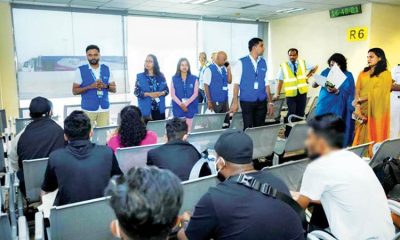
 Features7 days ago
Features7 days agoScammed and Stranded: The Dark Side of Sri Lanka’s Migration Industry
-
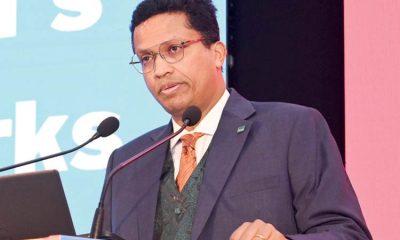
 Business7 days ago
Business7 days agoUN Global Compact Network Sri Lanka: Empowering Businesses to Lead Sustainability in 2025 & Beyond
-

 Features6 days ago
Features6 days agoDon’t betray baiyas who voted you into power for lack of better alternative: a helpful warning to NPP – II
-

 News4 days ago
News4 days agoCommercial High Court orders AASSL to pay Rs 176 mn for unilateral termination of contract
-
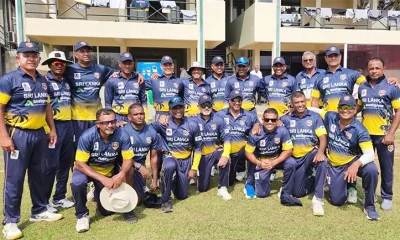
 Sports3 days ago
Sports3 days agoSri Lanka face Australia in Masters World Cup semi-final today
-

 Features6 days ago
Features6 days agoTwo films and comments
-
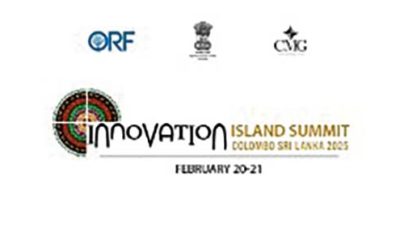
 News7 days ago
News7 days agoInnovation Island Summit 2025, Colombo, Sri Lanka


